
JP Journal of Algebra Number Theory and Applications
Scope & Guideline
Exploring the Depths of Algebra and Number Theory
Introduction
Aims and Scopes
- Algebraic Structures and Theory:
The journal emphasizes research on various algebraic structures such as rings, groups, algebras, and modules. It explores their properties, classifications, and applications, contributing significantly to the theoretical advancements in algebra. - Number Theory and Diophantine Equations:
A core area of focus is number theory, particularly the study of Diophantine equations and their solutions. This includes investigations into prime numbers, congruences, and other number-theoretic functions. - Cryptography and Security Applications:
The journal highlights the application of algebraic concepts in cryptography, particularly in the design and analysis of cryptographic schemes and protocols, showcasing the relevance of algebraic methods in modern security contexts. - Graph Theory and Algebraic Applications:
There is a notable interest in the intersection of graph theory and algebra, examining how algebraic methods can be applied to solve problems in graph theory, enhancing both fields. - Computational Mathematics:
Research involving computational techniques and algorithms in algebra and number theory is also a vital part of the journal's scope, addressing practical applications and efficiency in computations. - Emerging Mathematical Theories:
The journal encourages exploration of new theories and methodologies that emerge within algebra and number theory, fostering innovation and theoretical development.
Trending and Emerging
- Advanced Cryptographic Techniques:
There is a significant increase in research related to cryptography, particularly the development of new schemes and security models, indicating a strong trend towards applying algebraic methods in securing digital information. - Algebraic Geometry and Curves:
Emerging themes in algebraic geometry, particularly concerning algebraic curves and their properties, suggest a growing interest in the interplay between algebra and geometric structures. - Computational Algebra and Algorithms:
A marked trend in computational approaches within algebra, including algorithmic solutions to complex algebraic problems, reflects the increasing importance of computational tools in modern mathematical research. - Interdisciplinary Applications of Algebra:
Research that bridges algebra with other disciplines, such as physics, computer science, and engineering, is on the rise, showcasing the versatility and applicability of algebraic concepts in various fields. - Higher-Dimensional Algebraic Structures:
There is a growing interest in studying higher-dimensional algebraic structures and their implications, indicating a trend towards more abstract and generalized algebraic theories.
Declining or Waning
- Classical Algebraic Structures:
There has been a noticeable decrease in papers dedicated to traditional topics in classical algebra, such as basic group theory and ring theory, which may suggest a shift towards more contemporary and applied algebraic studies. - Elementary Number Theory:
Papers focusing on elementary number theory concepts, such as simple properties of integers and basic prime number theory, have become less frequent, possibly indicating a move towards more complex and abstract aspects of number theory. - Conventional Diophantine Analysis:
The analysis of classical Diophantine equations has seen a decline, with fewer papers addressing standard methods and solutions, which may reflect a broader interest in more modern or computational approaches to number theory. - Static Applications of Algebra:
Research that applies algebraic concepts in static or traditional contexts has diminished, suggesting a growing preference for dynamic applications, particularly in technology and cryptography. - Historical Perspectives in Algebra:
Themes that explore historical or foundational aspects of algebra appear to be waning, as the focus shifts more towards innovative applications and current research challenges.
Similar Journals

Rad Hrvatske Akademije Znanosti i Umjetnosti-Matematicke Znanosti
Advancing Knowledge in Mathematical SciencesRad Hrvatske Akademije Znanosti i Umjetnosti-Matematicke Znanosti is a distinguished journal published by the Croatian Academy of Sciences and Arts, focusing on the vast domain of mathematics and its multifaceted applications. Established in Croatia, this journal serves as a vital platform for scholars and practitioners to disseminate innovative and significant research findings in mathematical science. With an ISSN of 1849-2215, it has been indexed in Scopus, achieving a notable Q3 ranking in the miscellaneous category of mathematics, which reflects its influence and reach within the academic community. While currently not classified as an open-access journal, it endeavors to offer accessible insights and foster collaboration among researchers, professionals, and students. Published annually, it spans diverse topics critical to advancing mathematical understanding and promotes the exchange of ideas across international boundaries. Emphasizing quality, this journal contributes to the ongoing dialogue in the mathematical sciences, thereby strengthening academic ties and enhancing knowledge dissemination.

CZECHOSLOVAK MATHEMATICAL JOURNAL
Fostering Global Mathematical CollaborationCzechoslovak Mathematical Journal is a distinguished academic journal published by Springer Heidelberg, dedicated to advancing the field of mathematics through the dissemination of high-quality research. With an ISSN of 0011-4642 and E-ISSN 1572-9141, this journal has been a pivotal platform for mathematicians and researchers from around the globe since its inception. The journal holds a Q3 ranking in the field of Mathematics (miscellaneous), demonstrating its commitment to providing a forum for the latest mathematical theories and applications, particularly in general mathematics, as indicated by its Scopus rank of #285/399 and 28th percentile in the field. While currently not offering open access options, the journal continues to attract a wide readership by making its valuable content available through traditional subscription models. The Czechoslovak Mathematical Journal serves as an essential resource for researchers, professionals, and students aiming to stay informed about recent developments and breakthroughs in mathematics, with focus years converging from 1995 to 2024.
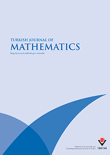
Turkish Journal of Mathematics
Innovating Solutions through Quality ResearchTurkish Journal of Mathematics is a prestigious academic publication dedicated to the advancement of mathematical research across a variety of subfields. Established in 1995 and published by the Tubitak Scientific & Technological Research Council Turkey, this journal has built a solid reputation, especially noted for its significant contributions to the field over the years, with its convergence spanning from 1995 to 2002 and again from 2006 to 2024. The journal, which holds a commendable Q2 ranking in Mathematics (miscellaneous) and is positioned in the 66th percentile of Scopus rankings for General Mathematics, aims to disseminate high-quality original research, reviews, and innovative methodologies to advance both theoretical and applied mathematics. Researchers, professionals, and students alike will find invaluable resources within its pages, providing insights that are pivotal for academic and practical applications in mathematics. Although it does not currently offer open access options, the journal remains an essential platform for those looking to engage with the forefront of mathematical inquiry.
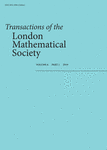
Transactions of the London Mathematical Society
Unlocking Innovations in Mathematics, Open to AllTransactions of the London Mathematical Society is a prestigious journal published by WILEY, dedicated to advancing the field of mathematics across various sub-disciplines. With its commitment to Open Access since 2014, the journal ensures that research findings are widely disseminated and accessible to a global audience, enhancing collaboration and innovation in the mathematical community. Based in the United States, this journal enjoys a prominent position within the academic landscape, evidenced by its Q1 ranking in the 2023 Mathematics (miscellaneous) category and its ranking of 181 out of 399 in the General Mathematics category on Scopus, placing it at the 54th percentile. The journal publishes high-quality, peer-reviewed research articles and surveys that aim to foster advanced study and discussion in mathematical sciences, making it an invaluable resource for researchers, professionals, and students alike. With a focus on original research and significant contributions, the Transactions of the London Mathematical Society continues to play a crucial role in the evolution of mathematical inquiry.
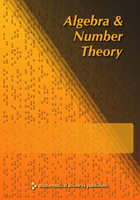
Algebra & Number Theory
Connecting Scholars Through Cutting-Edge Mathematical InsightsAlgebra & Number Theory, published by Mathematical Science Publications, stands at the forefront of mathematical research, particularly in the fields of algebra and number theory. With an ISSN of 1937-0652 and E-ISSN 1944-7833, this esteemed journal provides a dedicated platform for the dissemination of cutting-edge theoretical advances and practical applications. It has achieved a Q1 category ranking in both algebra and number theory according to the 2023 quartiles, reinforcing its critical role in shaping contemporary mathematical discourse. The journal serves as an essential resource for researchers, professionals, and students alike, offering insights into diverse mathematical methodologies and fostering open dialogue among scholars. Although it does not provide open access, its robust impact factor reflects the high quality and relevance of its published work. Based in the United States at the University of California, Berkeley, the journal's commitment to excellence continues to attract contributions that push the boundaries of mathematical understanding.
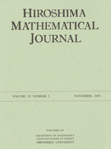
Hiroshima Mathematical Journal
Elevating Mathematical Scholarship for GenerationsThe Hiroshima Mathematical Journal, published by Hiroshima University, Graduate School of Science, serves as a prominent platform for disseminating high-quality research in the field of mathematics. Established in 1959, the journal has been an integral part of the mathematical community, focusing on areas such as Algebra, Number Theory, Analysis, and Geometry and Topology. Although currently classified in Q4 quartile rankings within its categories, the journal is committed to advancing mathematical knowledge and fostering scholarly dialogue. Its accessibility, combined with its long-standing history, makes it an essential resource for researchers, professionals, and students dedicated to exploring and enhancing the mathematical sciences. For those interested in contributing or accessing cutting-edge research, the Hiroshima Mathematical Journal continues to uphold its mission of excellence in mathematical scholarship.

ARS Mathematica Contemporanea
Innovating Research in Mathematics and BeyondARS Mathematica Contemporanea, published by UP FAMNIT in Slovenia, stands as a pivotal journal within the fields of algebra, number theory, discrete mathematics, geometric topology, and theoretical computer science. Since its inception in 2011, this journal has consistently provided a rich platform for innovative research, garnering a commendable Q2 category ranking in various mathematical domains, including Algebra and Number Theory, and Geometry and Topology, showcasing its growing influence and prestige in the academic community. With an increasing Scopus rank—particularly notable in Algebra and Number Theory at the 71st percentile—ARS Mathematica Contemporanea is dedicated to publishing high-quality, peer-reviewed content that advances the frontiers of mathematical knowledge. The journal’s commitment to open access ensures that valuable research is readily available to scholars, practitioners, and students alike, fostering collaboration and dissemination of ideas across the globe. As it converges towards its dedicated timeline extending to 2024, ARS Mathematica Contemporanea remains a crucial resource for those engaged in mathematical research, presenting an array of theoretical and practical insights that define contemporary mathematical discourse.
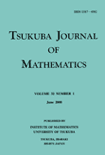
Tsukuba Journal of Mathematics
Elevating the Discourse in Mathematics for Global ImpactTsukuba Journal of Mathematics is a distinguished publication dedicated to advancing the field of mathematics through the dissemination of innovative research and comprehensive studies. Published by the University of Tsukuba, Department of Mathematics, this journal serves as a vital platform for mathematicians, researchers, and students to engage with cutting-edge mathematical theories and methodologies. Although currently not available as an open-access journal, it maintains a strong academic presence, contributing significantly to the global mathematical landscape. The journal invites submissions across various branches of mathematics, aiming to foster scholarly communication and collaboration. The ISSN 0387-4982 and the E-ISSN 2423-821X further establish its credibility and accessibility among the academic community, supporting its critical objective of facilitating high-quality research output. Situated in Tsukuba, Japan, a hub for scientific research and development, the Tsukuba Journal of Mathematics is committed to bridging gaps in mathematical knowledge and encouraging exploration of novel ideas.
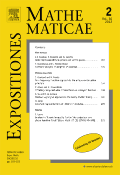
EXPOSITIONES MATHEMATICAE
Advancing Mathematical Frontiers with Rigorous ResearchEXPOSITIONES MATHEMATICAE, published by Elsevier GmbH, stands as a significant journal in the realm of mathematics, catering primarily to researchers, professionals, and students. With an ISSN of 0723-0869 and an E-ISSN of 1878-0792, this journal has made its mark in the academic community, boasting a Q2 classification in the miscellaneous mathematics category for 2023, illustrating its prominence within its field. The journal addresses a diverse scope of mathematical topics, encouraging the publication of original research and innovative theories while maintaining rigorous academic standards. As it converges from 2004 to 2024, EXPOSITIONES MATHEMATICAE continues to be an essential resource for advancing mathematical knowledge and fostering scholarly communication, despite being a non-open-access publication. Its location in Munich, Germany further anchors it within a rich intellectual tradition, providing accessibility for the mathematical community worldwide.
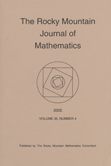
ROCKY MOUNTAIN JOURNAL OF MATHEMATICS
Fostering Collaboration in Diverse Mathematical FieldsROCKY MOUNTAIN JOURNAL OF MATHEMATICS, published by the Rocky Mountain Math Consortium, serves as a critical platform for researchers and practitioners in the field of mathematics since its inception in 1971. With a notable presence in the academic community, this journal covers a broad spectrum of mathematical disciplines, positioning itself in the Q2 category for Mathematics (miscellaneous) as of 2023. Despite being a subscription-based journal, it is recognized for its rigorous peer-review process and contributions to theoretical and applied mathematics, helping to advance knowledge and foster collaboration among mathematicians. The journal's ISSN number is 0035-7596 and its E-ISSN is 1945-3795, reflecting its commitment to accessibility and dissemination of high-quality research. Based in Tempe, Arizona, at Arizona State University, the journal continues to play an important role in shaping contemporary mathematical discourse through well-researched articles and innovative studies, aiming to bridge gaps between various mathematical subfields and engage a diverse audience, including students and established researchers alike.